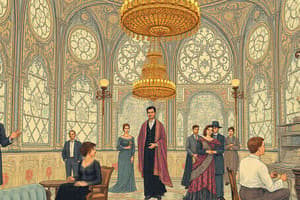Podcast
Questions and Answers
What does functionalism primarily focus on in society?
What does functionalism primarily focus on in society?
- The influence of individual actions
- Interrelated parts meeting social and biological needs (correct)
- The impact of technological advancements
- The economic factors driving social change
Which social institution is NOT considered a part of society's interrelated structure in functionalism?
Which social institution is NOT considered a part of society's interrelated structure in functionalism?
- Government
- Healthcare
- Fashion industry (correct)
- Education
According to Émile Durkheim's perspective, what is essential for the stability of society?
According to Émile Durkheim's perspective, what is essential for the stability of society?
- Rapid economic growth
- Shared values and symbols (correct)
- Individualistic beliefs
- Technological innovation
What term did Alfred Radcliffe-Brown use to explain the function of recurrent activities in society?
What term did Alfred Radcliffe-Brown use to explain the function of recurrent activities in society?
How does Robert Merton distinguish between manifest and latent functions?
How does Robert Merton distinguish between manifest and latent functions?
What concept describes the state where all parts of society work together harmoniously?
What concept describes the state where all parts of society work together harmoniously?
What did Durkheim emphasize as necessary for sociologists studying society?
What did Durkheim emphasize as necessary for sociologists studying society?
What function do laws serve within a society according to the functionalist perspective?
What function do laws serve within a society according to the functionalist perspective?
Flashcards
Functionalism
Functionalism
A theoretical perspective that views society like a living organism with interconnected parts working together to maintain stability.
Social Institutions
Social Institutions
Patterns of beliefs and behaviors focused on fulfilling basic needs like education, religion, or governance.
Social Facts
Social Facts
Social facts are aspects of social life that exert influence over individuals, like laws, morals, or customs.
Dynamic Equilibrium
Dynamic Equilibrium
Signup and view all the flashcards
Manifest Functions
Manifest Functions
Signup and view all the flashcards
Latent Functions
Latent Functions
Signup and view all the flashcards
Collective Conscience
Collective Conscience
Signup and view all the flashcards
Social Darwinism
Social Darwinism
Signup and view all the flashcards
Study Notes
Functionalism: A Structural-Functional Theory
- Functionalism views society as interconnected parts working to meet individual needs.
- It draws parallels between society and the human body, where parts cooperate for overall function.
- Key figures include Herbert Spencer, Émile Durkheim, Alfred Radcliffe-Brown, and Robert Merton.
Herbert Spencer's Influence
- Spencer saw society's various parts (social institutions like government, education, family) working together for societal function, akin to bodily organ function.
Émile Durkheim's Contributions
- Durkheim saw society as an interconnected, interdependent system maintaining stability.
- Society is held together by shared values, symbols, and languages.
- Sociologists should analyze social facts (laws, customs, etc.) to understand society, going beyond individual actions.
Radcliffe-Brown's Perspective
- Radcliffe-Brown defined function as a recurrent activity's contribution to social stability and continuity.
Dynamic Equilibrium
- In healthy societies, all parts work together to maintain equilibrium (a stable state).
Merton's Manifest and Latent Functions
- Manifest functions are intended (e.g., education gaining knowledge, career preparation).
- Latent functions are unintended (e.g., education meeting people, forming social hierarchies).
- Latent functions can be positive, neutral, or negative.
- Dysfunctions are social processes with undesirable consequences for society (e.g., truancy, dropping out of college).
Studying That Suits You
Use AI to generate personalized quizzes and flashcards to suit your learning preferences.




